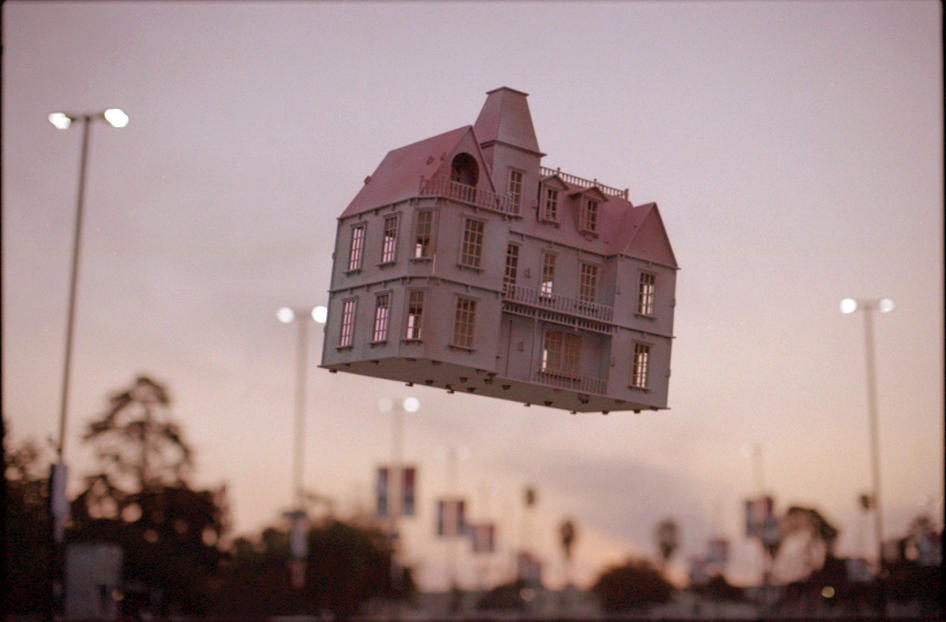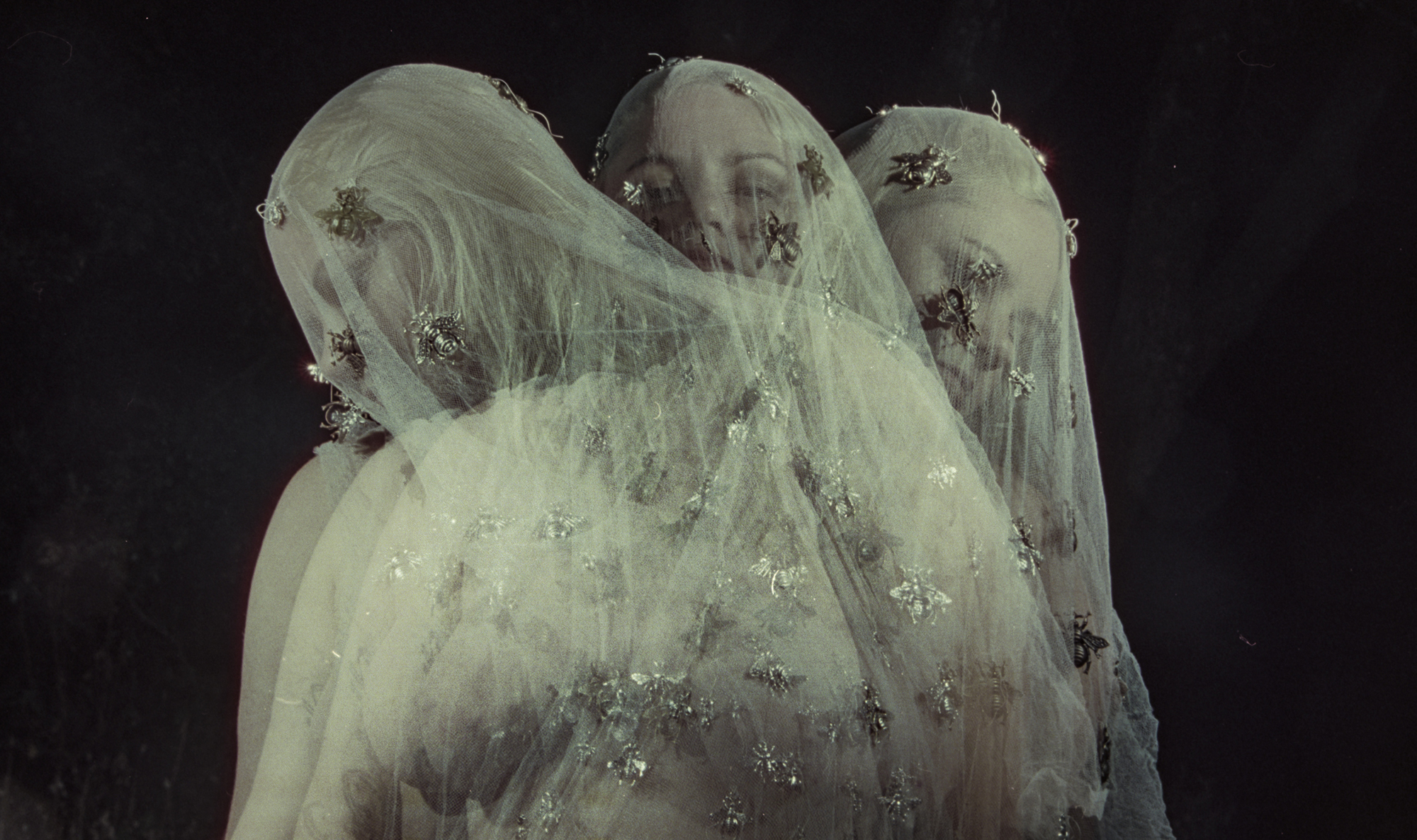
George the Raccoon
TEXT ROSS FARRAR
35 MM ASHLEY GUO
CREATIVE DIRECTION FARIDA AMAR
My grandparents moved into a roomy, craftsman-style four-bedroom house at the bottom of Mount Tamalpais in January of 1963, hauling everything they owned from a much smaller townhouse in San Rafael, including the broom, which would later prove disastrous. The new house was delicate—its previous owners had lived there for 30 years—where if one felled the porcelain toilet seat too quickly, it’d break in two, and the single-pane windows crackled on a hot day. The home was situated at the far backlot of a cul de sac on Evergreen Avenue, and the yard opened onto a vast forest expanse—hundreds of acres of California pines, redwoods, and many trails surrounding the great mountain.
The sixties, for a person born in the eighties (like me), seem futuristic. They dressed like astronauts and sat in pods to read the morning news. They wore cylindrical hairdos and ate everything from cans and boxes. Our family was quite waspy then; the old, far-right systems of thought still prevailed, regardless of President John F. Kennedy’s democratic ideals. Grandpa Lowe was very bald, standing five-and-a-half feet (in Red Wings), and stocky like a Roman pillar. He was a serious Republican who missed the Hoover days, and would vie for draconian law if given the chance. Grandma Maye was an inch taller with short, wavy blonde hair, similar to Grace Kelly’s. She had always been adaptable, moving from New Mexico to Arizona to Germany and back at a young age. Her vagabond upbringing made her somewhat pacific, more liberal than most of her peers, and a true lover of freedom.
The house consisted of said grandparents and my mother, Darnela (eighteen), who was pregnant with my sister. My mother was beginning a hike at the base of Mount Tamalpais one morning when she came across three young boys throwing large stones at a hazel bush the size of a washing machine. As she went in closer to get a better look, she discovered a newborn raccoon, eyes shut, shaking with fright. The boys went running as Darnela bent down in search of rocks to throw. “Get out of here ya little assholes!” She screamed.
She stood there for what seemed like hours debating what to do—leave it alone, take it to the vet, keep it? Finally, she got down on her hands and knees to free the whimpering animal from the gnarled branches, gently placing it in the kangaroo pocket of her smock.
When she entered the backyard, my grandmother was hunched over her tomato plants, gathering the fruit into a wooden bowl. Darnela pulled the animal from deep within her smock, as if by magic, and Maye nearly toppled over.
“Oh, my goodness gracious!” She cupped the tiny raccoon in her palms, lifting him to her face like water. “My dear, where did you find such a beautiful thing?”
“It was cowering in one of those witchy-looking bushes out back. A couple of kids were hucking rocks at him,” said Darnela.
Maye stared up at the sky with her mouth slightly ajar as if catching raindrops. “Well, I’m just beside myself.”
Later that day, Lowe came fumbling drunk through the garage. He was working in Oakland at 3M (Maintenance & Material Management) as a sectional manager. His area of expertise was industrial safety products: asbestos abatement, manhole smoke blowers, ventilation ducting. The house was safe from any airborne toxicity, at least.
An already-dark moving cloud circled their relationship, enveloping the household. Lowe and Maye had been fighting for years. He worked late hours, and his drinking had slowly become a daily event: scotch and ice, one after another until he couldn’t form sentences. Maye wasn’t the silent type, so she let him know how she felt, threatening to leave when she’d find him locked in the bathroom or crouched over the mouth of the toilet.
“What in God’s name is that little burglar doing here?” said Lowe, staring down at the animal. Maye had just bathed the raccoon in a stainless-steel colander in the sink.
“Isn’t he cuter than any puppy dog you’ve ever seen?” said Maye. “Look at his little hands—they look like tiny leather gloves.”
My grandfather cringed at the idea of a pet. He only liked animals cooked. “I don’t want that feral thing running through our home. What happens when he gets bigger and attacks one of us while we’re sleeping?” The raccoon shook dry and placed its head at the edge of the strainer, peering up at Lowe.
“We can train him, honey. Please, oh, please can we keep him?” From that point on, George was their second child.
George quickly became the catalyst for Lowe’s drinking. Maye was often tethered to the animal, which made it easier for him to slip out of the house and come home late. Maye worked at the Bank of America on California Street in San Francisco’s Financial District, which called for an early morning commute. She’d wake at 5 a.m., shower, and be in the living room for her daily 6 a.m. Kron4 news update. George slept in a deep, circular cat’s bed purchased from the Salvation Army and would wake with her, scuttling down to the kitchen where Maye would scramble an egg for him—dribbled with bacon grease on the weekends. After breakfast, she’d sit on the couch, and George would perch on the frame, unraveling each pink curler from her hair, dropping them one by one into her lap.
At night it was the same. Maye got home before Lowe and started dinner; from the kitchen sink, she’d spin a salad, passing leaves of still-wet butterhead lettuce to George as he patiently waited atop a stool.
As the years progressed, it seemed like George was slowly growing horns and a bifurcated tail. The toilet paper would be strewn about the bathroom in the morning, banana peels and apple cores were found in the entryway closet, potpourri all over the floor below the credenza. While everyone was away at work, George would hop the fence into the neighbor’s yard and untie their black labrador. Maye would find him there every day running in endless circles, dirt all over his fur, tracking mud into the house.
The older George became, the more problems arose. For one, Maye fed him too-large portions before leaving for work, and even bigger ones at dinner. Anyone who stopped over for supper would slip him leftovers (save for Lowe), and Darnela was the worst. She’d eat two bites very slowly over a 10-minute span, then slip the plate beneath the table when nobody was looking. George would find scraps where scraps shouldn’t’ve been found and sneak dry goods from the pantry at night. Soon, he had doubled in size.
Then it happened. One particular July afternoon, Lowe was let out of work early. It was the hottest day of the year. The black leather seats in his Pontiac were sticky with heat. People were out on their lawns sitting around the sprinklers. From the front door, he could hear rustling in the house that sounded like a cocktail party, and as he opened the door, a large raccoon ran quickly past his feet, almost tripping him. The kitchen was a bedlam scene: several raccoons were burrowing in the garbage container; one was on the top shelf above the stove—how it got up that high was a mystery. “SON OF A GOD DAMNED BITCH!!” Lowe screamed. The creatures went running out the backdoor—all except George, who sat upright, paws out like a raptor, looking up at Lowe in a remorseful guise. Lowe reached for the broom to shoo George from the mess and accidentally struck him in the temple, putting him out cold. Lowe panicked and called animal control. This, of course, was the worst thing he could’ve done. As they were leaving, one of the men explained that it was against the law to keep a raccoon as a pet—and that they could not legally return George.
The marriage dissolved shortly after the incident. Memorial Day came and Maye heard the sound of “Taps” being played up and down the streets—in the cars and homes, on every radio—as if lowering her past into the ground forever.
“It was the broom!” says my mother. “If dad hadn’t brought that broom in, it never would’ve happened. All that old energy attached to the new and bang! Things fuse.”
Things defuse, too, of course. The filament in a light bulb dims, the lint trap overflows and starts a fire—things must grow distal and decrease for us to feel change. Lowe’s passing was quick and without pause, coming on the family unannounced like a flu. He was diagnosed with early-onset Alzheimer’s on top of the creeping dementia he was already showing signs of. Only one month before his passing did he write the entire family off, swearing on his grave to never lay eyes on any of us again. This put Darnela into a deep depression. Still, the magic of dying does something to us. In it, we can begin anew.
I turned sixteen one day before the World Trade Center was attacked, so I’d been sleeping weird. We had a family of raccoons that frequented our yard at night. I kept my window ajar and would hear them charging back and forth on the fence top. Sometimes I’d see one and think of George, even though I’d never met him. Sometimes I’d see a big group of them and think about my grandfather standing in the kitchen with that broom, how it swept in the old, taking anything new and dirtying it.
I’d wake up in the middle of the night and go to the balcony, hearing something like animals thrashing around downstairs. The light in the dining room was always on, and there he was, in the same Orvis button-up fleece and creased slacks; the same shiny, bald head, sweeping the floors, mumbling something inaudible—names of those who weren’t members of our family.
You may also like
Willowview
“Darling, you look positively exhausted. Would you care to join me in the garden for afternoon tea
Prepare This Place For Bed
These bees in my mouth: oily, waxy, powerful—one flew into my mother’s mouth at a family picnic
The Romanian Inquisitor
Arrived in Cioroiași on Sunday, August 1 at 8:10 am. Since that time and to the day of this report,




